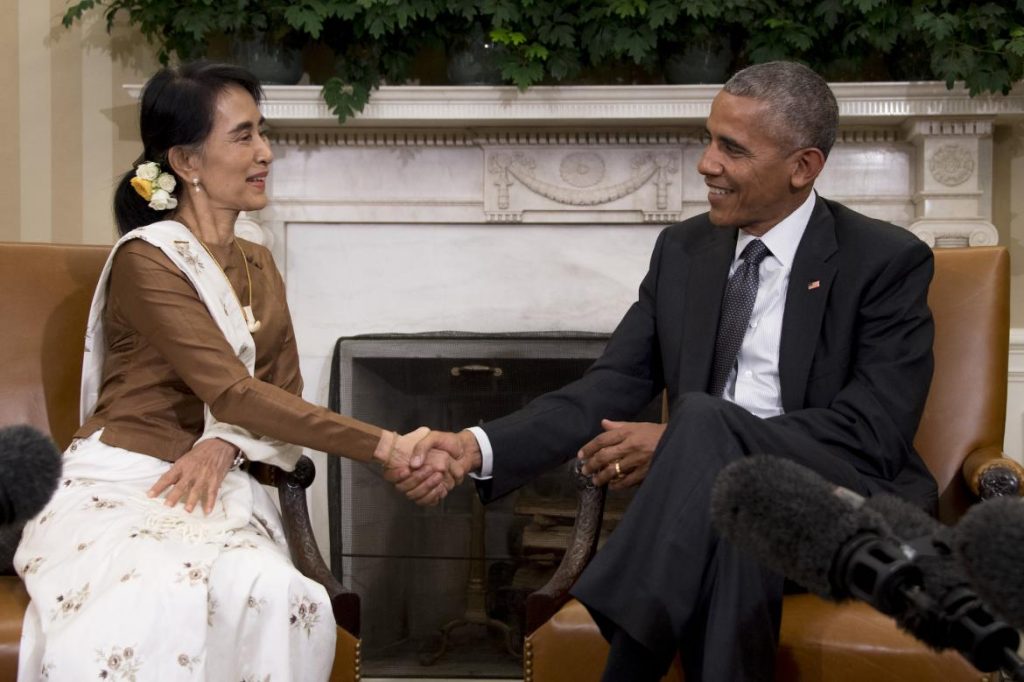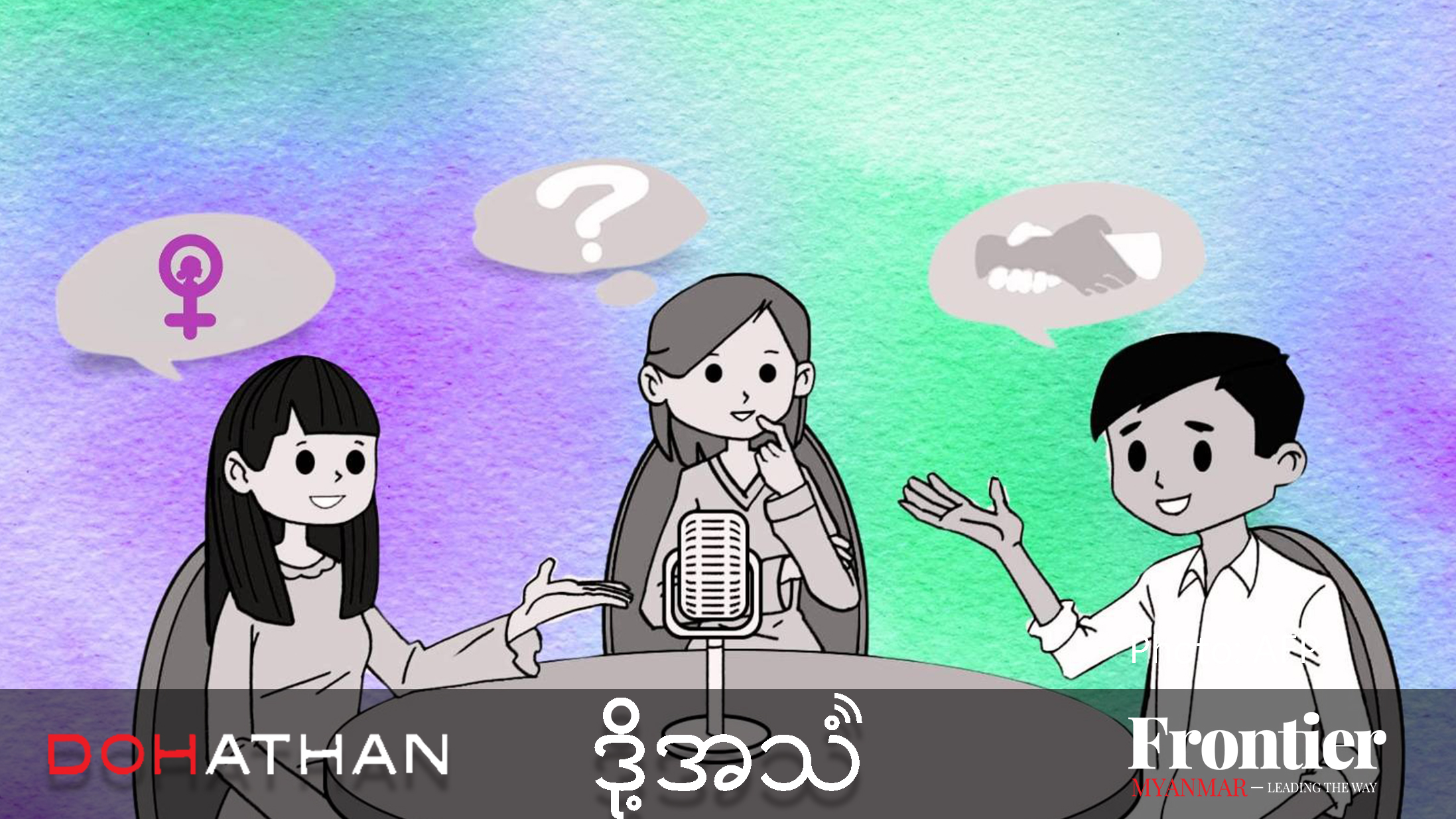By SEAN GLEESON | FRONTIER
YANGON — US President Barack Obama will work to reinstate preferential trade concessions for Myanmar and dismantle a large portion of the country’s sanctions regime, it was announced in Washington on Wednesday.
Following a White House meeting with State Counsellor Daw Aung San Suu Kyi, President Obama pledged to repeal executive sanctions against Myanmar in recognition of the country’s transition to a civilian government.
“The United States is now prepared to lift sanctions that we have imposed on Burma for quite some time,” Obama said Wednesday. “It is the right thing to do to ensure that the people of Burma see rewards for a new way of doing business.”
The decision to end the presidential declaration of a national emergency in Myanmar — first issued by the Clinton administration in 1997 and renewed annually for the subsequent two decades — will end targeted sanctions against 38 individuals and 73 associated entities.
Support more independent journalism like this. Sign up to be a Frontier member.
The removal of executive sanctions will additionally end the US State Department’s reporting requirements for prospective American investors, along with the longstanding ban on US importation of jade and rubies from Myanmar.
The Executive Orders enacting the current sanctions regime are expected to be lifted in the coming weeks. A congressional ban on assistance to Myanmar’s armed forces, in effect an arms and partial travel embargo, remains in place.
Speaking in the Oval Office, Aung San Suu Kyi told reporters she welcomed Wednesday’s announcement.
“We think that the time has now come to remove all the sanctions that hurt us economically, because our country is in a position to open up to those who are interested in taking part in our economic enterprises,” she said.
“We would like to invite all of you to come to see our country, to see why you should invest there, and see how you can invest there in such a way that you will benefit from it as much as we can.”
In a joint statement, President Obama also pledged to restore so-called “Generalized System of Preferences” trade benefits to Myanmar, more than two decades after they were revoked in response to human rights abuses under the former military junta. The measure will lower US tariffs on Myanmar imports.
Significant shift
Wednesday’s announcement marked a significant departure from the incremental easing of executive sanctions since 2012.
In May, President Obama issued an annual renewal of sanctions authority, retaining most targeted sanctions while removing ten state-owned entities. Reporting requirements for US investors were raised from $500,000 to $5 million, while other exemptions were broadened to prevent American investors from running afoul of US Treasury rules.
At the same time, a number of business entities associated with Mr. Steven Law were belatedly added to the US Treasury’s list of Specially Designated Nationals. Law was added to the sanctions list in 2007 after allegations of involvement in the heroin trade and numerous accusations of human rights abuses levelled at his Asia World conglomerate.
Soon after the changes, US Secretary of State John Kerry told an audience in Nay Pyi Taw that further sanctions relief would be tied to continued democratisation in Myanmar, including reform of the military-drafted 2008 Constitution.
Speaking at the same forum, Aung San Suu Kyi said her government was “not afraid of sanctions”, and supported the minimal changes that had been made the previous week.
Four months later, the executive sanctions regime will now be revoked entirely, at the reported urging of Aung San Suu Kyi.
In the time between, Pyithu Hluttaw speaker U Win Myint told reporters that the government would not launch any attempts at constitutional reform until the conclusion of its attempts to broker peace with the nation’s myriad non-state armed groups — a process which, if successful, is expected to take years.
In the aftermath of Wednesday’s announcement, prohibitions will soon be removed against a number of business leaders and firms associated with the previous military regime, including Mr. Law and Asia World, Tay Za of Htoo Group, and Zaw Zaw of Max Myanmar.
In a Thursday statement, Asia World spokesman Alex Wilk told Frontier that the conglomerate “expects to see a stronger economic growth and foreign investments in Myanmar with the removal of the sanctions.”
“With our continuing participation in the economic growth of Myanmar as good corporate citizens, we hope to make a difference for the people and Myanmar,” he added.
Sanctions against former junta leader Than Shwe and several ministers in the State Peace and Development Council will be revoked, although many may be subject to continuing congressional sanctions against the military.
Former Directorate of Defence Industries chief Thein Htay will also be removed, after his addition in 2013 for weapons deals with North Korea, but could still remain subject to the provisions of a US arms embargo on the pariah state.
Rights concerns remain
The wholesale end of executive sanctions will substantially lower the regulatory burden for prospective US investors in Myanmar.
Business advisory BMI Research wrote in May that US businesses remained reluctant to enter the local market after the incremental easing of sanctions, given the difficulty of “steering clear of the military and related tycoons” on the SDN list still in control of an outsized share of the national economy.
Chris Hughes, managing partner of legal firm Berwin Leighton Paisner’s Myanmar office, said the decision to axe remaining executive sanctions would also drive growth in non-American investment.
“Combined with the recent announcement of its economic policy priorities, Daw Aung San Suu Kyi’s decision to request the US government to lift the sanctions program sends a very strong signal that the Myanmar government is driving a strategy of investment and growth to achieve prosperity,” he wrote.
“It’s now time for a new wave of responsible investors to engage with the opportunities Myanmar offers — the door is open not only to US investors, but also investors from other countries and regions who were indirectly impacted by the sanctions, such as the UK, Europe and Japan.”
Human rights groups, meanwhile, had urged the Obama administration to block any drastic changes to the sanctions regime until more durable progress was made on democratic reform.
“The sanctions are crucial for pressing the military to end rights abuses and transfer power to a fully civilian government,” John Sifton, the Asia advocacy director for Human Rights Watch, wrote in a September 2 statement. “They shouldn’t be fully lifted until the democratic transition is irreversible.”
Of particular concern is the country’s infamous jade industry, dominated by former junta members, their associates, and the military holding company Union of Myanmar Economic Holdings Limited.
Centred on Hpakant in Kachin State, Global Witness estimated Myanmar’s jade trade to be worth $31 billion in off-the-books revenue for 2014, a figure equivalent to half of Myanmar’s official GDP.
Unsafe practices in the jade industry have resulted in the deaths of hundreds of small-scale miners, while mining revenues have been used to finance the long-running conflict between the military and the Kachin Independence Army in Myanmar’s north.
Global Witness told AFP Wednesday the announced changes were “a major setback for efforts to clean up Myanmar’s notoriously corrupt and abusive business environment.”
Inle Advisory Group, a consulting firm for prospective US investors, said on Wednesday that the National League for Democracy-led government was working to promote transparency and anti-corruption in the sector, citing the suspension of jade mining permits earlier this year.
Following the imminent end of executive sanctions, the group wrote, “investors will still have to contend with the myriad of issues present in the Myanmar market, as well as continue to undertake due diligence on prospective partners to ensure compliance with local and international standards or regulations.”
Rights groups remain concerned about the lack of legal redress for communities impacted by large investment projects.
Several megaprojects that have come under fire for human rights abuses, including the Myitsone Dam in Kachin State and the Letpadaung copper mine in Sagaing Region, are backed in part by firms featured on the current SDN list.
A proposed overhaul of foreign investment laws, which included a more robust framework for social and environmental protections, lapsed with the end of the last parliament. A new bill is expected in the current term.
With AFP in Washington. This article has been updated to incorporate statements from Asia World and BLP.







